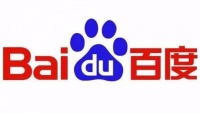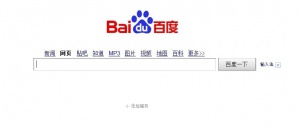Difference between revisions of "Baidu"
| Line 1: | Line 1: | ||
| − | + | {{Nav-Bar|Topics#B}} | |
| + | {{SoftwareInfoBox | ||
| + | |HEIGHT=580 | ||
| + | |NAME=Baidu | ||
| + | |LOGO=Baidulogo.jpg | ||
| + | |SCREENIMAGE=Baidu1.jpg | ||
| + | |CAPTION="Baidu" | ||
| + | |IMAGEURL=http://baidu.com | ||
| + | |TEXT=Site | ||
| + | |PLATFORM=Cloud Service | ||
| + | |PRODUCT=Search Engine<br>Encyclopedia<br>Discussion forum | ||
| + | |TYPE=E-Commerce<br>Cloud Based Storage<br>Artificial Intelligence | ||
| + | |SITEURL=http://baidu.com | ||
| + | |URLTEXT=www.baidu.com | ||
| + | |STATUS=Active | ||
| + | |LAUNCH=January 1, 2000 | ||
| + | }} | ||
'''Baidu''' (NASDAQ: BIDU) is the world's largest Chinese search engine, China's largest Internet integrated service company with information and knowledge as the core, and the world's leading artificial intelligence platform company. Baidu has thousands of research engineers, which is the top technical team in China.<ref>http://home.baidu.com/</ref> This team has mastered the most advanced search engine technology in the world, making Baidu a Chinese high-tech enterprise mastering the world's cutting-edge science and core technology, and making China one of the only four countries in the world with search engine core technology outside the United States, Russia and South Korea. Baidu has faced criticism for their data mining and targeted advertising practices, which were catalysts for an increased amount of debate surrounding the ethical implications of privacy online.<ref>http://patft.uspto.gov/netacgi/nph-Parser?Sect1=PTO1&Sect2=HITOFF&d=PALL&p=1&u=%2Fnetahtml%2FPTO%2Fsrchnum.htm&r=1&f=G&l=50&s1=5,920,859.PN.&OS=PN/5,920,859&RS=PN/5,920,859</ref> | '''Baidu''' (NASDAQ: BIDU) is the world's largest Chinese search engine, China's largest Internet integrated service company with information and knowledge as the core, and the world's leading artificial intelligence platform company. Baidu has thousands of research engineers, which is the top technical team in China.<ref>http://home.baidu.com/</ref> This team has mastered the most advanced search engine technology in the world, making Baidu a Chinese high-tech enterprise mastering the world's cutting-edge science and core technology, and making China one of the only four countries in the world with search engine core technology outside the United States, Russia and South Korea. Baidu has faced criticism for their data mining and targeted advertising practices, which were catalysts for an increased amount of debate surrounding the ethical implications of privacy online.<ref>http://patft.uspto.gov/netacgi/nph-Parser?Sect1=PTO1&Sect2=HITOFF&d=PALL&p=1&u=%2Fnetahtml%2FPTO%2Fsrchnum.htm&r=1&f=G&l=50&s1=5,920,859.PN.&OS=PN/5,920,859&RS=PN/5,920,859</ref> | ||
| Line 9: | Line 25: | ||
Li's original intention was to create a product to "provide the best and most equitable way for people to find what they are looking for".<ref>https://baike.baidu.com/reference/427116/74a23gpaBp1id7YOJTojsNSLYPiEFfKSdcxZ0sklG0MySaqCIrIVDI7sfDGNypGBR5cWQCy5R8-1HuQnhQDoSt7thhMetJlF</ref> This feat was accomplished as a result of the [[Wikipedia: Hyperlink|link analysis]] technology, which sorted search results based on how many connections they have with other pages. This algorithm was based on the assumption that the more times a page is linked from another site, the more credible it is. This assumption proved to be accurate, and since then, the company has rapidly expanded by producing new suites of products and acquiring new companies in many different markets. These products include [[Wikipedia: Baidu Baike|Baidu Baike]] (an online encyclopedia), [[Wikipedia: Baidu Wangpan: Baidu Wangpan]] (a cloud storage service), and [[Wikipedia: Baidu Tieba| Baidu Tieba]] (a keyword-based discussion forum), among others. | Li's original intention was to create a product to "provide the best and most equitable way for people to find what they are looking for".<ref>https://baike.baidu.com/reference/427116/74a23gpaBp1id7YOJTojsNSLYPiEFfKSdcxZ0sklG0MySaqCIrIVDI7sfDGNypGBR5cWQCy5R8-1HuQnhQDoSt7thhMetJlF</ref> This feat was accomplished as a result of the [[Wikipedia: Hyperlink|link analysis]] technology, which sorted search results based on how many connections they have with other pages. This algorithm was based on the assumption that the more times a page is linked from another site, the more credible it is. This assumption proved to be accurate, and since then, the company has rapidly expanded by producing new suites of products and acquiring new companies in many different markets. These products include [[Wikipedia: Baidu Baike|Baidu Baike]] (an online encyclopedia), [[Wikipedia: Baidu Wangpan: Baidu Wangpan]] (a cloud storage service), and [[Wikipedia: Baidu Tieba| Baidu Tieba]] (a keyword-based discussion forum), among others. | ||
| + | |||
| + | ==Mantra== | ||
| + | ==Data Centers== | ||
| + | ==Baidu Products== | ||
| + | ==Ethical Implications== | ||
| + | ==See Also== | ||
| + | |||
| Line 15: | Line 38: | ||
| | | | ||
*[http://www.baidu.com Baidu] | *[http://www.baidu.com Baidu] | ||
| + | *[http://en.wikipedia.org/wiki/Baidu Baidu - Wikipedia] | ||
}} | }} | ||
Revision as of 02:31, 9 March 2021
|
Baidu (NASDAQ: BIDU) is the world's largest Chinese search engine, China's largest Internet integrated service company with information and knowledge as the core, and the world's leading artificial intelligence platform company. Baidu has thousands of research engineers, which is the top technical team in China.[1] This team has mastered the most advanced search engine technology in the world, making Baidu a Chinese high-tech enterprise mastering the world's cutting-edge science and core technology, and making China one of the only four countries in the world with search engine core technology outside the United States, Russia and South Korea. Baidu has faced criticism for their data mining and targeted advertising practices, which were catalysts for an increased amount of debate surrounding the ethical implications of privacy online.[2]
Contents
History
In 1994, Robin Li (Yanhong Li, 李彦宏) joined IDD Information Services, a New Jersey division of Dow Jones and Company, where he helped develop software for the online edition of The Wall Street Journal.[3] He also worked on developing better algorithms for search engines and remained at IDD Information Services from May 1994 to June 1997.
At the end of 1999, Li saw the great potential of China's Internet and Chinese search engine services. He resolutely resigned from Silicon Valley's high paying job and brought patent technology of search engine, and founded Baidu Inc in Zhongguancun in January 1, 2000. After that, Baidu launches independent search portal baidu.com and their own search engine within one year. In 2003, Baidu surpasses Google and becomes the preferred search engine for Chinese netizens. According to data from Analysys International, Baidu has a respectable market share of 58%, well above Google (Google's market share is arround one third). [4]
Li's original intention was to create a product to "provide the best and most equitable way for people to find what they are looking for".[5] This feat was accomplished as a result of the link analysis technology, which sorted search results based on how many connections they have with other pages. This algorithm was based on the assumption that the more times a page is linked from another site, the more credible it is. This assumption proved to be accurate, and since then, the company has rapidly expanded by producing new suites of products and acquiring new companies in many different markets. These products include Baidu Baike (an online encyclopedia), Wikipedia: Baidu Wangpan: Baidu Wangpan (a cloud storage service), and Baidu Tieba (a keyword-based discussion forum), among others.
Mantra
Data Centers
Baidu Products
Ethical Implications
See Also
External Links
References
- ↑ http://home.baidu.com/
- ↑ http://patft.uspto.gov/netacgi/nph-Parser?Sect1=PTO1&Sect2=HITOFF&d=PALL&p=1&u=%2Fnetahtml%2FPTO%2Fsrchnum.htm&r=1&f=G&l=50&s1=5,920,859.PN.&OS=PN/5,920,859&RS=PN/5,920,859
- ↑ Robin Li's vision powers Baidu's Internet search dominance Archived February 3, 2011, at the Wayback Machine, Taipei Times, September 17, 2006.
- ↑ How Google took on China—and lost. MIT technology review, 19 December, 2018.
- ↑ https://baike.baidu.com/reference/427116/74a23gpaBp1id7YOJTojsNSLYPiEFfKSdcxZ0sklG0MySaqCIrIVDI7sfDGNypGBR5cWQCy5R8-1HuQnhQDoSt7thhMetJlF

